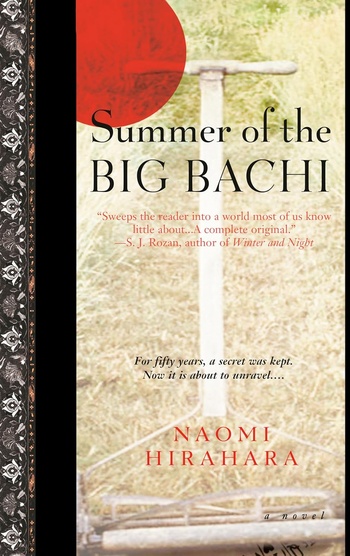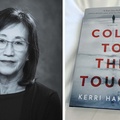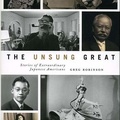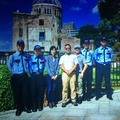In honor of the twentieth anniversary of Naomi Hirahara’s first Mas Arai novel, Summer of the Big Bachi, today we reprint the review of the novel published originally on the JANM Store’s website in 2004.
The reluctant sleuth of Naomi Hirahara’s highly praised new mystery would ordinarily rather deal with killing snails than solving a baffling murder.
In the stifling summer heat of Altadena, a sleepy Los Angeles suburb at the base of the San Gabriel Mountains, curmudgeonly Mas Arai spends much of his time hanging out with his buddies in the back room of a run-down lawnmower shop. The elderly Japanese American gardener listens with disdain as the other old men drone on about the latest drought or blower ban.
But for over 50 years, Mas has harbored some dark secrets. Secrets about the lives of three friends. About his youth in Hiroshima in the days before an atomic bomb descended from the sky. And about his fears of bachi—the spirit of retribution.
When a stranger arrives, asking disturbing questions about someone from Mas’ distant past, a brutal homicide occurs, sending Mas on an urgent search for long-buried truths.
With Summer of the Big Bachi, her debut novel, author Hirahara introduces readers to a different kind of literary detective—the iconic “Japanese gardener” in a crime-solving role. The lead character is loosely based on Hirahara’s father, who is also a Hiroshima survivor and Los Angeles-area gardener.
“Actually, my father would make a terrible detective,” Hirahara says, with a laugh. “Now that he is semi-retired, his favorite activity is to play go and mahjong on the Internet for countless hours. It would make for a pretty boring book! But since he is a Kibei, someone who spent the war years in Japan, he is a bit of an outsider in America. He has a wonderful vantage point that allows him insights into so many things.”
The novel is the first of several planned Mas Arai mysteries, making Hirahara something of a trailblazer among Asian American authors.
“I may be the first Japanese American woman writer to publish a mystery series,” Hirahara says. “I didn't originally conceive of Summer of the Big Bachi as a series but my publisher really wanted one. Although I was at first a little apprehensive, it's been a great challenge and opportunity. My readers will really get a chance to get to know, identify and even fall in love with Mas Arai. And I hope that through his eyes readers will be able to see different pockets of the Japanese American community.”
That community is one Hirahara knows well, having previously worked as a longtime editor of The Rafu Shimpo, the largest Japanese American daily newspaper. (She also has authored the Japanese American National Museum’s non-fiction American Profiles series.)
In unexpected ways, Hirahara finds her background as a journalist and biographer helpful to her fiction writing.
“At times when I got stuck with a plotline in Bachi, I imagined interviewing my character Mas,” she says. “I know that this sounds crazy, interviewing an imaginary person. But sometimes it helped me to discover an important ‘fact’ about him.”
In writing her novel, Hirahara also gained some interesting observations about her father—who hasn’t read the book he inspired.
“I think there's an element of fear there perhaps because the book won't be any good or that it’ll be too revealing,” Hirahara explains. “I recently spoke to another Japanese American author, and she said her parents also didn’t read her books. I don’t blame parents for being afraid. Having a writer in the family is very unusual.”
Nevertheless, Hirahara hopes that Asian American writers’ successes as mainstream authors someday will be anything but unusual.
“I think there’s an untapped market for mysteries about Asian Americans,” Hirahara says. “College students today have so many Asian American literary works at their disposal. However, there are still not many writers of commercial fiction—specifically, mystery, romance, and science fiction. There’s room for much, much more.”
Aided by one determined Japanese American gardener-turned-sleuth, Hirahara is aiming to fill some of that room with well-crafted storytelling.
* * * * *
Read Naomi’s reflections on Summer of the Big Bachi twenty years later here.
© 2004 Darryl Mori











